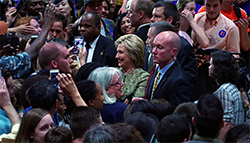Election email hack coverage protected by First Amendment, but media missed opportunity to provide full context, professor says
LAWRENCE — Hacks of the Democrats’ emails and allegations of varying levels of Russian interference in the 2016 presidential election generated nearly endless news coverage, and the fallout continues today — with some saying the coverage helped elect Donald Trump. A University of Kansas journalism professor and legal expert recently completed a study exploring that coverage and the legal and ethical propriety of reporting on stolen materials like the hacked emails.
 Jonathan Peters, assistant professor of journalism and a First Amendment scholar, published the report in the Columbia Journalism Review and presented it at Columbia University, where he appeared alongside journalists from The Washington Post and ProPublica.
Jonathan Peters, assistant professor of journalism and a First Amendment scholar, published the report in the Columbia Journalism Review and presented it at Columbia University, where he appeared alongside journalists from The Washington Post and ProPublica.
“I was drawn to the topic,” Peters said, “because of a New York Times story in December that referred to the press, including the Times, as a ‘de facto instrument of Russian intelligence’ in the sense that press organizations publicized the fruits of an unlawful hack connected to the Russian government.”
Following an in-depth review of the news coverage of the Democrats’ hacked emails, the report shows that the First Amendment would pre-empt most claims against the press for reporting on the emails, and it shows that ethically the emails that generated coverage mostly did merit at least some coverage. However, the report concludes that how the emails were presented was lacking. Too many stories focused on juicy details from the emails and not on what they meant, if anything, to the presidential campaign or American politics.
“Overall, the biggest deficiency in the email coverage,” the report observes, “was the failure to contextualize the [emails’] contents and to judge their significance. [It was] a missed opportunity that the coverage was not more informative and proportional. It fell short of journalism’s social responsibility by not giving citizens what they needed for competent self-governance.”
 For example, a CBS story Oct. 25 reported on an email that suggested that President Obama knew about Clinton’s use of a private email server earlier than he had said. The story quoted the email and noted that it had been hacked from an account belonging to John Podesta, chairman of Hillary Clinton’s campaign. But the story did not discuss the likely source of the email, widely reported at the time to be Russian operatives, nor did it discuss any background about Clinton’s use of a personal server. The report says the story failed “to inform readers meaningfully about an important matter."
For example, a CBS story Oct. 25 reported on an email that suggested that President Obama knew about Clinton’s use of a private email server earlier than he had said. The story quoted the email and noted that it had been hacked from an account belonging to John Podesta, chairman of Hillary Clinton’s campaign. But the story did not discuss the likely source of the email, widely reported at the time to be Russian operatives, nor did it discuss any background about Clinton’s use of a personal server. The report says the story failed “to inform readers meaningfully about an important matter."
Peters also considers whether news organizations should report on information from a source that acquired it using illegal or questionable methods — i.e., the Democrats’ emails, which were hacked in violation of numerous laws. He argues that a source’s “identity, motives and means are not in themselves reasons to publish or not” and that “source savoriness” cannot dictate if a news organization uses information. Peters points out that without information from unsavory sources, many of the most important news stories of the last century may have never come to light.
With that in mind, the report distills various ethical and journalistic principles into a general standard for news organizations to use when making editorial decisions regarding information from questionable sources, to be applied on a case-by-case basis. It found that it is just to publish truthful private information if:
- The information relates to a legitimate public concern
- The public’s need for it cannot be met otherwise
- The benefit of publication outweighs the harm, analyzed by reference to the affected people and entities and to society.
That standard points to the importance of verifying all information and the constant need to minimize harm, among other things.
Peters says his hope is that the report will generate a sustained discussion about how the press reports on stolen materials. That kind of self-assessment is critical because, as he notes in the conclusion, "many questions remain unanswered about the hacks and leaks, but one thing is clear: They’re unlikely to be the last disclosures that put journalists in the position of reporting on materials of questionable sourcing.”
Photo: Hillary Clinton attends a campaign rally in Durham, North Carolina, in this March 2016 photo. The Democrat's use of a private email server was a perpetual issue raised during her presidential campaign. Image via WikiCommons, courtesy Nathania Johnson.